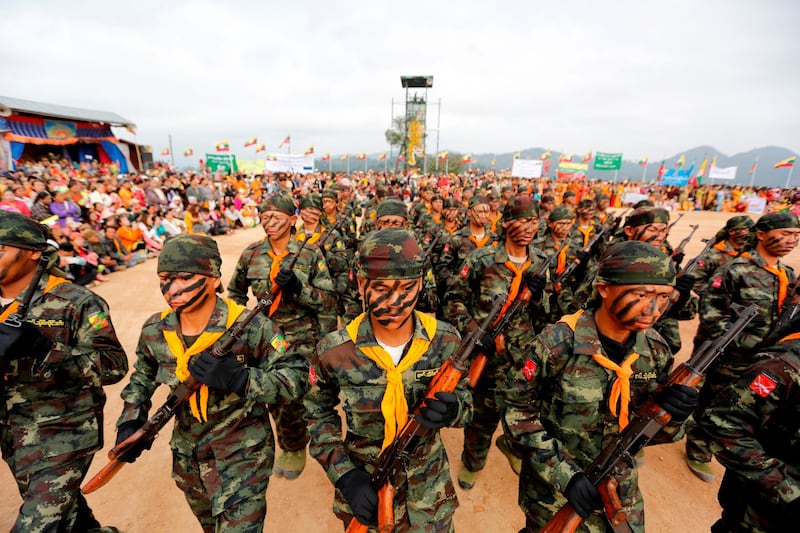Myanmar’s junta has launched offensives on ethnic armed rebels in Shan state amid a lack of progress on peace talks, prompting fear among residents of widespread fighting in the region.
Clashes between junta troops and the Shan State Progressive Party/Shan State Army, or SSPP/SSA, in southern Shan’s Laihka township, and the Ta’ang National Liberation Army, or TNLA, in northern Shan’s Muse, Lashio and Kutkai townships since late last month are the military’s first orchestrated attacks against the groups since its 2021 coup d’etat.
Analysts said the offensives suggest the junta is trying to cut off the flow of weapons from the two groups to the armed resistance in lower Sagaing and Magway regions.
Following pressure from the junta on SSPP/SSA troops to withdraw from Laihka, fierce fighting broke out between the two sides on Aug. 6, prompting around 1,000 ethnic Ta’ang and Shan people to flee area villages, according to SSPP/SSA spokesman Major Sai Phone Han.
“There has been news that all anti-junta forces will be driven out from the Laihka area,” he told RFA Burmese, noting that the military had called in reinforcements of about 1,000 more soldiers, including members of the pro-junta Pyi Thu Sit militia. “[Anti-junta armed groups] in the south have tried to convince us to come to them, but we intend to stay here [to ensure the security of the area].”
In the meantime, residents of Laihka said they are frightened because of increased junta troop activity in the township.
“One side of the fighting has reinforced and the other side is trying to block them – it’s worrying indeed, as the tension between them is high,” said one resident, who declined to be named citing security concerns. “We saw two military junta helicopters hovering over our town today.”
The resident said that the local community is worried that the fighting will reach the seat of Laihka township, noting that those displaced by earlier clashes have yet to return home.

In Muse, Lashio and Kutkai townships, junta troops and TNLA forces fought “nearly everyday” from July 23 to Aug. 12, with the military deploying attack helicopters in Lashio during the last two days, TNLA spokesman Lieutenant Col. My Aik Kyaw told RFA.
“We don’t know what they aim to achieve in their offensives,” he said, adding that at least a dozen battles took place over the period.
RFA attempts to reach junta Shan state spokesman and economic minister Khun Thein Maung regarding the situation in the region went unanswered Thursday.
RFA contacted junta Shan State Security and Border Affairs Minister Colonel Sein Win by telephone, but he declined to comment, saying he was in a meeting.
Targeting flow of weapons
Than Soe Naing, a researcher of Myanmar affairs, told RFA he believes the junta is putting pressure on ethnic armies in Shan state to stop the flow of weapons to the armed resistance in other parts of the country.
"[The military] assumes that the weapons flowing into Sagaing and Magway are coming from the Ta’ang region, so blocking the Ta’ang region is an important task for them,” he said. “No matter how many political discussions they hold with the … armed groups [in Shan], including the Ta’ang, they cannot help but interfere militarily. That’s why they will continue to fight.”
He said that the junta wants to remove the SSPP/SSA from Laihka and replace it with a rival group, the Restoration Council of Shan State/Shan State Army, or RCSS/SSA, with whom it has a good relationship, and is willing to fight a protracted war to do so.
While the SSPP/SSA is not a signatory to the Nationwide Ceasefire Agreement, signed in 2015 and aimed at ending the country’s long-running armed conflicts, it is among the groups that meet frequently in the capital Naypyidaw with the junta’s Peace Delegation.
Two other rebel groups signed the agreement in 2018, bringing the number to 10. The signatories want a national military that cannot participate in politics and the formation of a federal democratic union in Myanmar.
The peace process was killed off when the Myanmar military seized power from the elected civilian-led government in a February 2021 coup, sparking new waves of violence with ethnic armies joining forces with anti-junta resistance fighters and engaging in insurgency and heavy clashes across the country.
TNLA leaders said that the situation in Shan state “depends on the military,” and that fighting is likely to continue as the junta’s offensive intensifies.
Translated by Myo Min Aung. Edited by Joshua Lipes.
